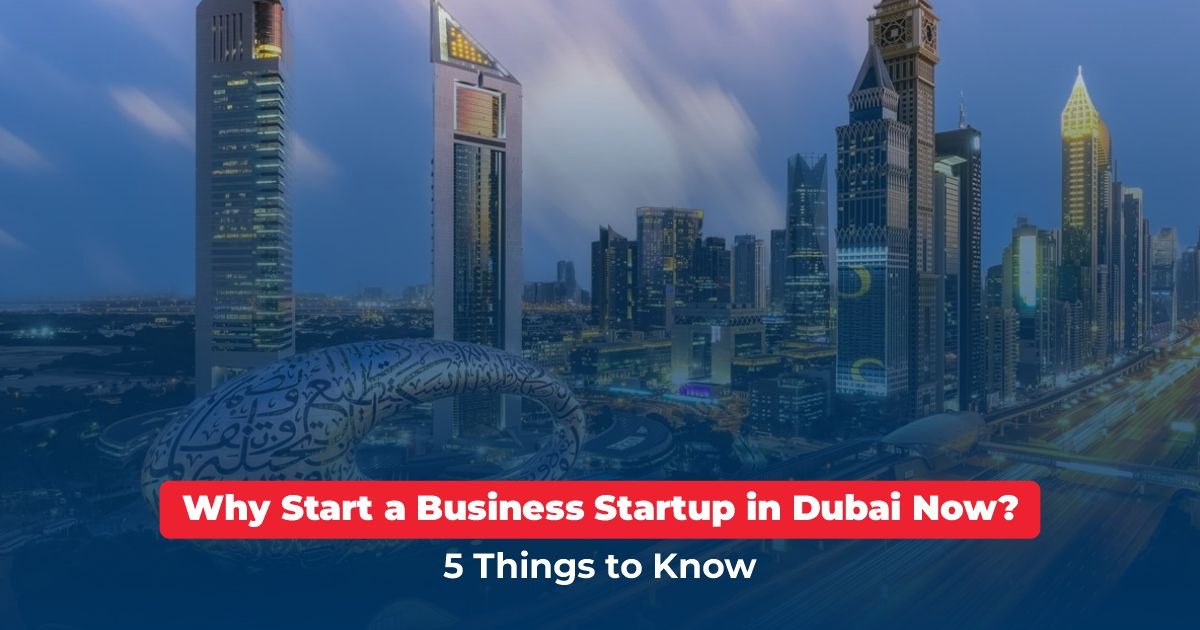Business startup in Dubai is surging—Dubai issued 200,000 new economic licenses across the UAE in 2024, per the UAE Minister of Economy at WEF 2025 (economymiddleeast.com). Why such rapid growth? Could 2025 be your year to start? If you’re planning a business, here are 5 essential things to know before you begin.
Table of contents
|
Why Dubai Wins for New Businesses?
Dubai isn’t just shiny skyscrapers — it’s a real launchpad for serious founders. If you’re looking to start smart, here’s why Dubai gives you the edge.
Top Perks You Can’t Ignore
- No taxes on earnings: There is no company tax in free zones. Only after making AED 375,000 in profit do mainland companies pay 9%.
- Full business ownership: You keep 100% control. No local sponsor needed for most activities since 2023.
- Global access made easy: Dubai connects to over 2 billion customers across Asia, Africa, and Europe.
- Lightning-fast setup: Register and start in 3–10 days. No more waiting months like in other countries.
- Top talent everywhere: Hire skilled people from 200+ countries. Build multilingual teams that understand global markets.
Dubai vs. Other Business Hubs: Clear Comparison
| Feature | Dubai | Other Countries |
| Tax Rate | 0% (Free Zones) | 20%–35% |
| Ownership | 100% Foreign | 51% Local Partner |
| Setup Time | 3–10 Days | 2–6 Months |
| Visa Access | 10-Year Golden Visas | Complex Work Permits |
| Office Costs | Flexi-Desks (~AED 7,000) | Fixed Leases Only |
Why It Works in 2025?
- Dubai is investing heavily in tech, AI, and green energy.
- That means real grants for SaaS, fintech, and sustainability startups.
- Tourism is booming again — hospitality, delivery, and transport firms are growing fast.
- Saving a large amount on taxes each year means you can afford to hire top talent or expand faster.
Avoid setup agencies offering AED 5,000 shortcuts. They often skip ESR filings, real licensing checks, and leave you stuck. Dubai rewards those who do it right — start smart.
Which Company Type Is Best for a Business Startup in Dubai?
Choosing the right company type shapes everything—your growth, budget, ownership, and where you can operate. Dubai offers many structures. Your job is to pick the one that matches your startup needs.
Key Company Types for Business Startup in Dubai
-
Limited Liability Company (LLC)
-
-
- LLC is the Best for startups aiming at the local UAE market
- Allows broad business activities
- Personal liability is limited
- Needs a local partner (unless the activity is eligible for 100% foreign ownership)
- Can trade across the UAE
- Physical office required
- Offers visa eligibility for staff
-
-
Free Zone Company (FZE/FZC)
-
-
- 100% foreign ownership allowed
- Setup is fast and simple
- Trading is limited to inside the zone or outside the UAE
- Local market trade needs a distributor
- Lower setup costs in many zones
- Perfect for media, technology, e-commerce, logistics, and export.
- Offers office flexibility: flexi-desks, shared offices
- Visa quota based on office size
-
-
Sole Proprietorship
-
-
- One owner with full control
- Setup is simple and quick
- Personal liability is unlimited
- Only allowed for certain nationalities
- Physical office required
- Ideal for consultants, freelancers, or low-risk businesses
-
-
Civil Company
-
-
- Formed by professionals practicing the same field
- Common for lawyers, architects, doctors
- Requires at least two partners
- Unlimited liability applies
- Needs a local service agent (LSA)
- Suitable for professional service firms
-
-
Branch Office
-
-
- An extension of a foreign parent company
- Must match the parent company’s activity
- The parent holds full liability
- Needs LSA
- Ideal for global businesses expanding into Dubai
- Cannot conduct separate business outside the parent’s scope
-
-
Offshore Company
-
-
- Full foreign ownership
- Cannot trade inside the UAE
- No office or visa required
- Best for holding assets or international invoicing
- Offers privacy and low cost
-
-
Public or Private Joint Stock Company (PJSC/PSJC)
-
- Suitable for large businesses needing capital
- Minimum capital is high
- Allows public shareholding
- The setup is complex and takes longer
- Mostly used by corporations, not early-stage startups
Comparison Table
| Company Type | Ownership | Liability | Market Access | Office Required | Best For |
| LLC | 51% local / 100% for some sectors | Limited | Full UAE | Yes | Local market reach |
| Free Zone FZE/FZC | 100% foreign | Limited | Free zone + export | Varies | Online/export businesses |
| Sole Proprietorship | 100% (select nationalities) | Unlimited | Mainland only | Yes | Freelancers/individuals |
| Civil Company | Shared | Unlimited | Mainland only | Yes | Professional partnerships |
| Branch Office | Parent Company | Unlimited | As per the parent | Yes | Foreign company expansion |
| Offshore | 100% foreign | Limited | Outside the UAE only | No | Asset holding |
| PJSC / PSJC | Public/Private | Limited | UAE + Global | Yes | Capital raising, large firms |
How to Choose the Right Type?
- Define your business activity
- Decide if you need full ownership
- Think about liability risk
- Check if you need UAE-wide trading
- Set your budget for setup and annual fees
- Know your visa needs
- Plan how fast you want to launch
Key Points to Remember
- LLC suits general trade, services, and local sales
- Free Zones offer 100% ownership, fast setup, but no mainland sales
- Sole Proprietorship is simple but risky due to unlimited liability
- Civil Company is ideal for partners with shared professions
- The Branch Office is for foreign businesses entering the Dubai market
- Offshore firms work well for international invoicing, not local sales
- Joint Stock structures are for big players, not most startups
Key Decision Factors
| Factor | Consideration | Best Option |
| Ownership | Need full control? | Free Zone / LLC (some sectors) |
| Market Access | Need UAE sales? | LLC / Sole / Civil |
| Setup Cost | Want lower startup costs? | Sole / Civil / Free Zone |
| Risk Level | Prefer limited personal liability? | LLC / Free Zone / PJSC |
| Setup Speed | Need to launch fast? | Free Zone (specific zones) |
| Business Nature | Offering services or trading? | LLC / Civil / Free Zone |
| Visa Needs | Planning to hire staff? | LLC / Free Zone |
Your choice shapes your startup’s success in Dubai. Each company type has pros and cons. Review your market, risk, and growth goals. Choose the structure that supports your business model.
Need help deciding?
Visit businesslinkUAE. Their expert team helps with setup, documents, and all approvals. Start your journey right—clear, fast, and stress-free.
10 Essential Licenses Required for a Business Startup in Dubai
To run a business startup in Dubai, you must have the correct license from the start. Your business model, location, and activity will determine this. Getting it right avoids delays, fines, and rejection.
Essential Licenses You May Need
1. Commercial License
- For trading activities like import, export, and retail Selling products (e.g., clothes, electronics).
- Best for stores, shops, and general trading companies.
- Apply via the Free Zone authority or the DED.
2. Professional License
- For services like legal, design, repairs, IT, and consulting.
- Common for professionals, specialists, and freelancers.
- UAE nationals are often required as local service agents.
- Where: DED or Free Zones.
- Cheaper setup, no warehouse needed.
3. Industrial License
- For manufacturing, assembling, big production, or packaging goods.
- Needed for factories or production-based startups.
- Requires safety and environmental clearance.
- Where: DED + Ministry of Industry.
4. Tourism License
- Needed for travel agencies, hotels, desert safari tours, or tour companies.
- Must get approval from Dubai’s tourism authority.
- Where: Dubai Tourism Department.
- Get activity-specific permits (e.g., dune bashing).
5. Freelance Permit
- For individuals working solo in design, writing, media, or coding.
- Offered in specific free zones with a simple setup. (e.g., Dubai Media City).
- No office rent—work from home.
6. E-commerce License
- For online stores or service platforms.
- Apply through the DED or the relevant free zone.
7. Import/Export Code
- Needed if your startup trades goods across borders.
- Issued by Dubai Customs.
8. Food License
- Required for handling, preparing, or selling food.
- Needs approval from Dubai Municipality.
9. Healthcare Approval
- For clinics, salons, wellness, or medical services.
- Requires extra permits from DHA or other health bodies.
- Approval takes 2-4 weeks extra.
10. Free Zone License
- Allows 100% foreign ownership.
- Useful for export-focused or tech startups.
- No local sponsor needed.
Business License Table for Dubai Startups
| License Type | Applies To | Issued By | Notes |
| Commercial License | Retail, trading, e-commerce | DED / Free Zone | Ideal for trading businesses |
| Professional License | Consulting, IT, legal services | DED / Free Zone | May need a local service agent |
| Industrial License | Manufacturing or factories | DED / Ministry of Industry | Extra environmental permits needed |
| Tourism License | Travel, tours, hotels | Dubai Tourism | For inbound/outbound tourism setups |
| Freelance Permit | Individuals (media, design) | Free Zone Authorities | Low-cost, flexible setup |
| E-commerce License | Online selling | DED / Free Zone | For web-based businesses |
| Import/Export Code | Border trade | Dubai Customs | Needed for import/export activities |
| Food License | Food prep, sales | Dubai Municipality | Health and safety checks apply |
| Healthcare Approval | Clinics, gyms, salons | DHA / Health Authorities | Requires inspections and permits |
| Free Zone License | Tech, export, services | Free Zones (e.g., DMCC) | 100% foreign ownership, no sponsor needed |
Choose your license based on your core activity. Decide if you want to operate in the mainland or free zones. Each option affects cost, ownership, and setup time. Still unsure? Business Link can walk you through each step clearly and quickly.
Which 12 Documents Are Essential for a Dubai Business Startup?
Setting up a business startup in Dubai needs preparation. You’ll need to gather the right papers early. This saves time and avoids delays. While some documents vary by business type or location (mainland or free zone), most follow the same pattern. Below is a short and clear list to help.
Required Documents for Business Setup in Dubai
| Document | Purpose | Applies to |
| Passport Copy | To verify the identity of the owner/shareholders | All |
| Visa Copy / Entry Stamp | Shows legal entry into the UAE | Foreign owners |
| Emirates ID (if available) | National ID for UAE residents | Residents only |
| Proof of Address | Often, a utility bill or a tenancy contract | Mainland & Free Zones |
| Trade Name Reservation | Confirms business name approval | All |
| Initial Approval Certificate | Allows proceeding with the setup | All |
| Business Plan | Required for some activities | Free zones & banks |
| Memorandum of Association (MOA) | Details company structure and activities | LLCs & partnerships |
| Local Service Agent Agreement | For sole/professional setups with UAE agents | Civil company, Sole Prop. |
| Lease Agreement / Ejari | Confirms physical office space | Required in the mainland |
| No Objection Certificate (NOC) | Needed if a resident is sponsored by another entity | Residents under a visa |
| Shareholder Resolution | For corporate shareholders | Branches, multi-partner firms |
Key Notes
- You’ll need more papers if your startup deals with medical, food, media, or finance.
- For free zones, documents are simpler and processes are faster.
- Some free zones don’t ask for Ejari. Instead, they offer flexi-desk options.
- Banks usually ask for a stamped business plan, passport, license, and MOA.
- Keep scanned copies of all papers. Submit clear, color PDFs to avoid rejections.
Want to avoid mistakes and speed up your setup? Visit Business Link UAE. Their professionals will walk you through every step. They know which documents match your case and help with legal papers, visas, and registration.
Consulting experts can help you stay on track. Get help from a trusted team. Avoid delays. Stay compliant. Start strong.
What are the ten essential steps for starting a business in Dubai?
Starting a business in Dubai can feel complex, but clear steps make it manageable. The procedure is explained simply in this guide. Follow these stages carefully to open your company fast, legally, and without surprises.
Step 1: Choose Your Business Activity
- Define what your company will do: trade, services, tech, or consultancy.
- Dubai’s authorities list over 2,000 approved activities.
- Your choice affects the license type and where you can operate.
Step 2: Select Legal Structure
- Choose from options like LLC, Sole Proprietorship, or Free Zone company.
- Structure affects ownership, liability, and visa eligibility.
- Free zones restrict local trade while allowing 100% foreign ownership.
Step 3: Reserve Your Trade Name
- Pick a unique name that matches your business activity.
- Follow Dubai’s strict naming rules (no religious or offensive words).
- Submit to the DED or Free Zone authority for approval
Step 4: Obtain Initial Approval
- Apply for government preliminary approval to proceed.
- Submit passports, proposed business activity, and trade name documents.
- Approval allows you to continue licensing steps, but it isn’t a license yet.
Step 5: Draft Legal Documents
- Prepare your Memorandum of Association (MOA) or Local Service Agent agreement.
- Prepare a Memorandum of Association (MOA) for LLCs.
- LSA needed for some professional Mainland companies, where a UAE national assists but owns no shares.
Step 6: Secure Business Location
- Rent physical or virtual office space as per your license requirements.
- Mainland companies require Ejari-registered tenancy contracts.
- Some Free Zones offer flexible desk options to reduce costs.
Step 7: Apply for a Business License
- Submit the MOA, tenancy contract, passport copies, and initial approval
- Choose between Commercial, Professional, or Industrial license
- Pay the required fees; licensing time varies by jurisdiction.
Step 8: Register with the Relevant Authorities
- Some businesses need extra registrations, like with the Chamber of Commerce.
- Check specific industry requirements early to avoid delays.
Step 9: Open a Corporate Bank Account
- Choose a bank and submit your license, MOA, lease, and shareholder IDs.
- Bank approval can take from a few days to weeks, depending on the bank.
Step 10: Apply for Visas
- After licensing, apply for investor visas, employee visas, and family visas.
- Visa numbers depend on office size and license type.
- Complete medical tests and Emirates ID procedures as part of the process.
Why Following These Steps Matters
- Avoid costly mistakes and fines by meeting all legal requirements.
- Save time by understanding document needs and approval order.
- Build trust with clients and suppliers through proper licensing.
- Gain confidence knowing you comply with Dubai’s business laws.
Business Startup in Dubai: Step-by-Step Table
| Step | Action | Description | Authority / Where to Apply | Notes |
| 1 | Choose Activity | Select an approved business activity | DED or Free Zone Authority | Affects license type and operating scope |
| 2 | Select Legal Structure | LLC, Free Zone, Sole Proprietorship, etc. | N/A | Impacts ownership rights, costs, and visas |
| 3 | Reserve Trade Name | Unique and rule-compliant business name | DED or Free Zone Authority | Must be unused and follow naming guidelines |
| 4 | Initial Approval | Get preliminary government consent | DED or Free Zone Authority | Required before submitting license documents |
| 5 | Draft Legal Documents | MOA or LSA agreements | N/A | Key to establishing your legal company setup |
| 6 | Secure Office Space | Rent office (physical or virtual) | Landlord or Free Zone | Ejari-registered lease needed for the mainland |
| 7 | Apply for a License | Submit documents and pay relevant fees | DED or Free Zone Authority | The license type depends on the chosen activity |
| 8 | Register with Authorities | Get any extra permits needed | Chamber of Commerce, Municipality | Industry-specific permits may apply |
| 9 | Open a Bank Account | Submit company papers for account opening | Banks | Required to process business payments |
| 10 | Apply for Visas | Apply for investor, employee, and family visas | Immigration Department | Visa limits depend on office size and license |
Beging a business in Dubai becomes simpler with a clear, step-by-step plan.
Clear knowledge avoids delays and fines. Whether choosing Mainland or Free Zone, understanding your legal needs helps you launch confidently. If you want expert support, Business Link can guide you through every stage with local insight and experience.
Ready to start your Dubai business journey? Visit BusinesslinkUAE for personalized help and clear advice to turn your startup idea into reality.
Dubai Business Setup Costs: No-Nonsense Breakdown
Startup costs in Dubai aren’t fixed. They change based on your license type, office choice, and visa needs.
Below is a clear breakdown of the main costs for both mainland and free zone setups.
Typical Costs (Mainland / Free Zone)
- License Fees
AED 6,000 to AED 30,000 yearly
Free zones usually cost less than the mainland - Office Space
Flexi-desk: starts at AED 8,000 per year
Whereas, physical offices hit AED 25k+. - Visa Costs
plan AED 4k–7k per visa
Medical tests and Emirates ID included
- PRO Services
AED 4,000 to AED 12,000
Covers all paperwork. Avoids delays or rejection - Deposits
Some free zones require refundable deposits
Often around AED 10,000
Mainland vs. Free Zone Cost Comparison
| Expense | Mainland | Free Zone | Key Difference |
| License Fee | AED 12k–30k | AED 6k–25k | Free zones are often cheaper |
| Office | Ejari required | Flexi-desk allowed | Save up to 70% |
| Local Sponsor | AED 12k–20k/year | Not needed | Major mainland cost |
| Visa Quota | Linked to the office | Flexible limits | Easier to expand in a free zone |
Critical Notes
- Hidden Fees
Translation: ~AED 500 per page
Bank charges: AED 2,000–5,000 - Activity-Based Fees
Tourism, food, or healthcare licenses may need an AED 50,000 deposit - Renewals
Add 20% more to your second-year budget
Underestimating costs sinks 40% of Dubai startups. Always add a 15% buffer.
Need Precise Numbers?
Call Business Link UAE. Their team:
- Speaks in plain English or Arabic
- Flags hidden costs before you commit
- Offers fixed-price packages with no surprise fees
They help you start right. Fast, clear, and stress-free.
Summary
Why start a business startup in Dubai now? Because the city is growing fast, with thousands of new companies launching each year.Additionally, Business Link UAE is available to help you at every turn. From licenses to opening the bank account, we simplify your journey so you can focus on success. Don’t wait—take action today and turn your business idea into reality with expert help you can trust.
FAQ’s
Do I need a local sponsor for a business startup in Dubai?
Not always. Many free zones allow 100% ownership. Mainland setups may need a local service agent depending on the business type.
How long does it take to launch a business startup in Dubai?
With the right help, it often takes 3–7 working days. Free zone setups are usually faster than mainland company registration.
Can I obtain a visa for Dubai through my newly started business?
Yes, most business licenses include investor or partner visas. You can also sponsor your family and employees after setup.
Why choose Business Link for a business startup in Dubai?
Because they offer step-by-step help, from license choice to visa support. Their team makes your business startup in Dubai faster and easier.
Is an office address required when starting a business in Dubai?
Yes, in order to obtain a company license in Dubai, you need to have an actual office or workspace.
Which financing possibilities are available to a Dubai-based startup company?
You can try bank loans, investors, or government grants to fund your business startup in Dubai.
Can foreigners to acquire 100% ownership for a business startup in Dubai?
Yes, 100% foreign ownership is now common.2 Many Free Zones and numerous Mainland business activities permit full foreign control.
Which license is ideal for a small startup in Dubai?
Many small businesses begin with a professional or commercial license. Free zones are ideal for simple, low-cost startup setups.




